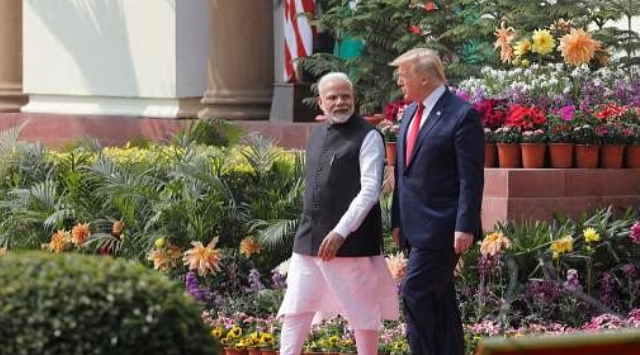The Ministry of External Affairs in New Delhi even cited Pakistani Foreign Minister Ishaq Dar’s statement during a TV interview that Islamabad had never considered using the option of using its nuclear weapons in response to the military offensives against India.

Prime Minister Narendra Modi’s government on Tuesday not only specifically dismissed all claims made by President Donald Trump and his administration about the United States brokering a ‘ceasefire’ between India and Pakistan and pre-empting a nuclear conflict, but also categorically rejected his offer to mediate on the issue of Kashmir.
To dismiss Trump’s repeated claims about avoiding a nuclear war in South Asia, India underlined that all military actions launched by its armed forces in response to the escalatory offensives by Pakistan were in the domain of ‘conventional’ warfare. The Ministry of External Affairs in New Delhi even cited Pakistani Foreign Minister Ishaq Dar’s statement during a TV interview that Islamabad had never considered using the option of using its nuclear weapons in response to the military offensives against India.
New Delhi also dismissed Trump’s claim that the US had made the two South Asian nations agree on a ‘ceasefire’ by using the threat of stopping trade with both India and Pakistan. Randhir Jaiswal, the spokesperson of the Ministry of External Affairs (MEA), said that the issue of trade had never come up during the talks between the US officials and the top brass in New Delhi from the time ‘Operation Sindoor’ commenced on May 7 till the understanding was reached between India and Pakistan on cessation of military actions on May 10.
“We have a longstanding national position that any issue pertaining to the Indian Union Territory of Jammu and Kashmir has to be addressed by India and Pakistan bilaterally. That stated policy has not changed,” the MEA spokesperson told journalists in New Delhi.
He was responding to a question on New Delhi’s reaction to the US president’s latest offer to mediate between India and Pakistan to help resolve the issue of Kashmir. He also reiterated the Modi Government’s position that the only “outstanding matter” regarding Kashmir was the end of Pakistan’s illegal occupation of certain areas, which were integral parts of the union territory of India.
Modi had rejected Trump’s offer to mediate between India and Pakistan on the dispute over Kashmir, telling him directly that it had been a bilateral issue between the two neighbours.
New Delhi has been steadfastly maintaining for years that the 1972 Simla Agreement between India and Pakistan and the 1999 Lahore Declaration had left no scope for any third party to play any role in resolving the issues between the two neighbours.
Trump had on Saturday announced the ‘ceasefire’ between India and Pakistan in Washington, even before the understanding to end the almost four-day-long cross-border military offensives and counter-offensives by the two South Asian nations had been confirmed by the two governments in New Delhi and Islamabad. Despite subtle rejection by New Delhi, he had repeated the claim on Sunday and Monday.
Jaiswal, however, on Tuesday emphatically rejected the claim of Trump as well as of his Secretary of State and National Security Advisor, Marco Rubio, about the US role in brokering the ‘ceasefire’. He said that the High Commission of Pakistan in New Delhi had conveyed to the MEA headquarters, at around 12:37 p.m. on Saturday, a request from Islamabad for a phone call between Pakistan’s Director General Military Operations and his counterpart in India. He said that the request from Islamabad had been conveyed to New Delhi after the armed forces of India had carried out “an extremely effective attack on key Pakistani Air Force bases” in the morning on Saturday. “That was the reason they were now willing to stop firing and military action. Let me be clear. It was of force of Indian arms that compelled Pakistan to stop its firing,” said Jaiswal, dismissing the US claims that the calls from Rubio and Vice President J D Vance to Islamabad and New Delhi had resulted in the ceasefire.
“The Pakistani side had initial difficulties connecting the hotline to the Indian side for technical reasons. The timing was then decided based on the availability of the Indian DGMO at 1535 hours (on Saturday),” said the MEA spokesperson, adding: “The specific date, time and wording of the understanding was worked out between the DGMOs of the two countries at their phone call on 10 May 2025 commencing 1535 hrs.”
He said that India’s message during conversations with “other nations” had been “clear and consistent” and similar to what New Delhi had been conveying from public platforms as well. “It was that India was responding to the April 22 terrorist attack (near Pahalgam in J&K) by targeting the terrorist infrastructure. However, if the Pakistani armed forces fire, the Indian armed forces will fire back; if Pakistan stops, India will also stop,” said Jaiswal.







